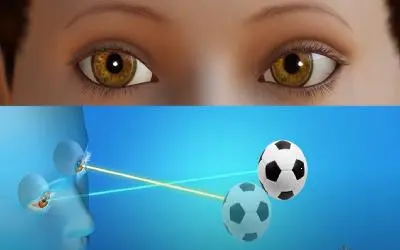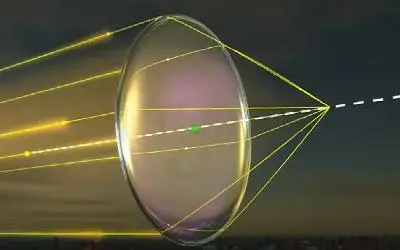Binocular vision dysfunction (BVD), a common eye condition that arises after a traumatic brain injury (TBI), has been showed to prompt anxiety and panic attacks.
Imagine your eyes working together as a team, each presenting your brain with two different images. Your brain seamlessly merging these pictures into one crystal-clear image. This incredible ability helps you see the world around you in a complete and vivid way.
When the eyes are misaligned, the brain struggles to combine the two images together. This results in a condition called binocular vision dysfunction (BVD).
When your vision team isn’t working smoothly, it can make your eyes feel tired and bring a bunch of not-so-great symptoms along for the ride, including:
- Double vision
- Light sensitivity
- Poor depth perception
- Difficulty reading
- Reduced attention span
- Dizziness and disorientation
- Difficulty navigating through crowds
- Anxiety and panic attacks
- Nausea and vomiting
- Neck and shoulder pain
HOW DOES BVD LEAD TO ANXIETY?
Severe Binocular Vision Dysfunction (BVD) can turn a simple stroll outdoors into a dizzying experience, potentially triggering panic attacks.
For individuals unaware of their BVD condition, experiencing unexplained dizziness and disorientation can significantly heighten their anxiety.
The anxiety stemming from BVD can evolve into agoraphobia, making individuals hesitant to venture outside. Places bustling with visual stimuli, such as stores or malls, become overwhelming and can even induce panic attacks.
When BVD interferes with concentration, especially during activities like reading or working, it poses challenges in performing well at work or school. This, in turn, amplifies anxiety levels.
So, what’s the solution?
While anxiety pills may offer relief for some concerns, they might not address anxiety caused by BVD. In fact, certain anxiety medications can negatively impact vision, worsening symptoms and anxiety.
To kickstart the journey towards alleviating anxiety, consider scheduling a checkup for your eye health and vision, known as a Functional Vision Evaluation.
If BVD is the culprit behind your anxiety, we’ll assess whether your eyes struggle to work together or track objects. Additionally, we’ll identify any other skills your eyes may be lacking for optimal vision.
How is BVD treated?
When you’re dealing with Binocular Vision Dysfunction (BVD), the go-to fix involves using prism spatial lenses. Imagine them as glasses that work to realign your vision and kick eye strain, dizziness, and all those other uncomfortable symptoms to the curb.
these specialized prism spatial lenses act swiftly, reducing BVD symptoms by a significant 30-50% almost immediately. Even better, with consistent use, they can further improve relief to an impressive 70-80%. It’s akin to providing your eyes with an incredible upgrade, swiftly easing discomfort and enhancing vision!
Neuro-optometric rehabilitation
Optimal vision isn’t just about seeing clearly; it’s about how your eyes and brain work together. Sometimes, specific challenges require a personalized approach like neuro-optometric rehabilitation, complemented by prism lenses. These interventions target the root of the issue.
Neuro-optometric rehabilitation focuses on enhancing crucial visual skills, fostering clear binocular vision by strengthening communication between your eyes and brain. This process bolsters effective visual processing, contributing to overall improvement.
Anxiety can significantly affect your life, and surprisingly, an undiagnosed vision problem might be an underlying factor. If you’re grappling with anxiety, it’s worth considering your visual health.
Schedule a comprehensive eye and vision evaluation with an eye doctor. This assessment can uncover potential issues, guiding you towards personalized solutions to improve both your vision and overall well-being.



